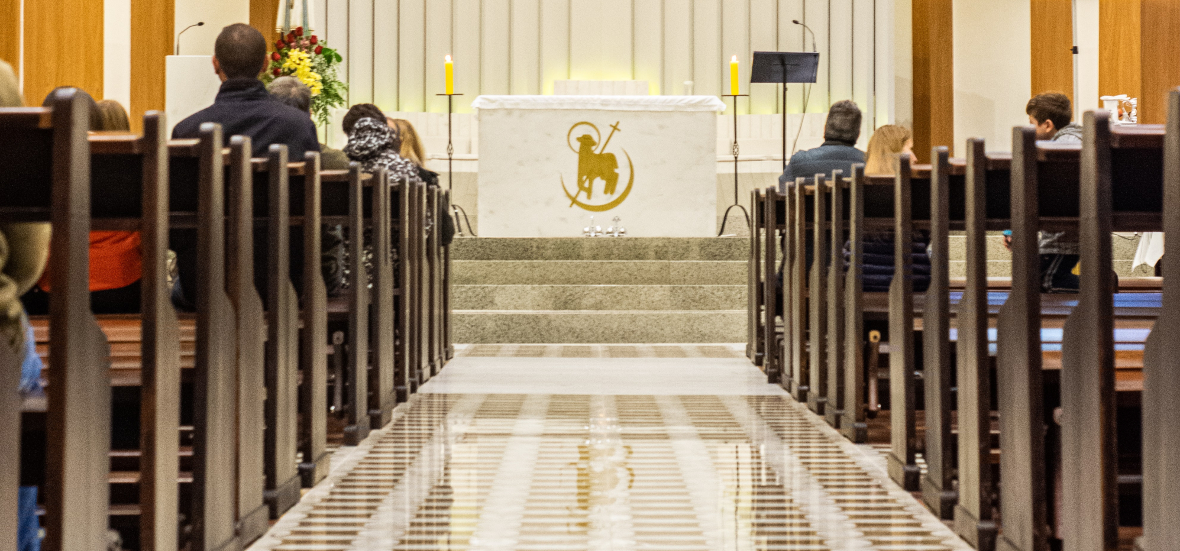
[caption id="attachment_172326" align="aligncenter" width="1180"] Image by Mateus Campos Felipe (2019), Unsplash.com, CC0/PD[/caption]
Image by Mateus Campos Felipe (2019), Unsplash.com, CC0/PD[/caption]
Like many of you, I have been in quarantine for upwards of about ten weeks. When things started to heat up, we stopped going to Mass the week before everything closed down, in part because we weren’t sure if one of us was sick. Also in part because we felt that we were risking getting ourselves sick, and we had very recently became almost the sole volunteers for Meals on Wheels, a program that delivers meals to vulnerable people with little to no mobility. It seems like it’s been ages upon ages since we have been able to go to Mass and receive the Eucharist.
There are so many things that have gone through my mind about this situation. Ranging from great sadness to patient endurance to little to no feelings about it. It is normal to go through feeling all these things. It’s okay to go from one minute feeling like Mass can’t come back soon enough to the next feeling resigned but at peace that we are doing this for the sake of those who are vulnerable.
There is one thing that will damage us, though, and that’s when we take for granted our ability to receive the Eucharist. I’ve seen this in several places, but most notably was a letter that was signed by a large number of people, professional people and us regular people alike, that seemed to demand that the bishops provide the Eucharist because people needed it to go on living.
[caption id="attachment_172328" align="aligncenter" width="3024"] Image by Mateus Campos Felipe (2019), Unsplash.com, CC0/PD[/caption]
Image by Mateus Campos Felipe (2019), Unsplash.com, CC0/PD[/caption]
I am going to highlight a few things that make this sit uncomfortably. First, the Eucharist is the greatest gift we can receive outside of Baptism, and yes, it is our most sustaining sacrament. And yet I point this out because it seems to have been missed by a number of folk: It is a gift. A gift is not demanded. A gift is not expected. A gift is not looked upon as something to have at the expense of others. What matters in this attitude is the spirit of acceptance into which God calls us. When we start demanding, we start turning the epicenter of the issue into "me." It becomes about me, me, me. The sense of gift is lost.
Second, we are called to be saints. Perhaps I’m not well-read enough about the saints, but I do not recall any of them demanding the bishops do more to provide the Eucharist and sacraments to the people, especially during a time of a very contagious virus. There are saints who have been refused the Eucharist for little reason, and yet remained obedient because this is the kind of suffering that begets saints. Even when we may be wronged, we are to be in no hurry to demand betterment but instead offer up the suffering for God’s glory. This is the call of sainthood: bringing God glory.
Another disturbing aspect is that in demanding the Eucharist, we place ourselves in defiance of our bishop(s). If there’s one thing I’ve learned from reading St. Faustina’s Diary, which echos many saints’ experiences, it’s that we need to learn obedience in faith rather than follow our personal desires. In writing this, I feel an immediate need to highlight that in cases of abuse, obedience is different and must be reported, but I also recognize that in those cases it’s not really about faith, but about power.
For the majority of us, if we are unwilling to be obedient to our bishop, we have to seriously check ourselves. It is entirely possible they may be wrong on something, and yet still we are called to be obedient because they have been appointed by the Church, inspired by the Holy Spirit, to lead us in our faith. I say this as a person who has experienced sexual abuse by a priest and whose bishop was informed of this matter, and who completely and utterly ignored it. I understand the wrong that bishops can do, maybe better than most who wrote that public letter. But I refuse to ascribe to the belief that the Holy Spirit is no longer present in their authority. Suspending Masses for the safety of the faithful, especially the vulnerable, is also a far cry from a bishop who has allowed abuse to happen knowingly. Intention is extremely important.
[caption id="attachment_172327" align="aligncenter" width="6016"] Image by Ben White (2017), Unsplash.com, CC0/PD[/caption]
Image by Ben White (2017), Unsplash.com, CC0/PD[/caption]
Jesus is waiting for us. We offer a greater gift to Him in our suffering with joy than with being miserable and demanding of this Gift. After all, Paul tells us that we proclaim Christ crucified -- we should expect this life to be the epitome of misery but still be able to hold to the joy of the Resurrection. I’ve not been convinced of that by any Catholics on social media yet. Can we bear our suffering with love and joy? We know that this will not last forever.
Separation from Jesus in the Eucharist is difficult, but we have been given no reason to lose our hope. It is incumbent upon us to carry our burdens as Christ carried his. This is the standard to which we need to hold ourselves, not lowering ourselves to uncharitably criticizing the bishops for trying to take care of their flock the best way possible.
[tweet "Our longing for the Eucharist should bring us closer into communion with the Body of Christ. By @janekorvemaker"]
Our longing for the Eucharist should bring us closer into communion with the Body of Christ. We are not truly separated; the Holy Spirit ensures that. We are called to support each other and continue to find our hope in Jesus in the best way we have available to us. In normal times, it is often at Mass. These days, let our desire and longing drive us toward better unity, that we may be one as Christ prayed.
Copyright 2020 Jane Korvemaker
About the Author

Jane Korvemaker
Jane Korvemaker loves food, family, wine, and God (perhaps not in that order). She holds a Certificate in Culinary Arts, which pairs perfectly with her Bachelor in Theology. A former Coordinator of Youth Ministry, she writes from the beautiful and cold province of Saskatchewan, Canada. She works from home and takes care of her three very hard-working children. Jane regularly blogs at AJK2.ca.


.png?width=1806&height=731&name=CatholicMom_hcfm_logo1_pos_871c_2728c%20(002).png)
Comments